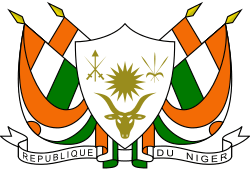Nigerien presidential election, 1999
 |
| This article is part of a series on the politics and government of Niger |
|
|
Politics portal |
A presidential election was held in Niger in late 1999, with the first round on October 17 and a second round, coinciding with a parliamentary election, on November 24. The election followed a coup d'état on April 9, 1999, in which Ibrahim Baré Maïnassara, who had led an earlier coup in January 1996 and won a disputed presidential election in July 1996, was assassinated. Coup leader Daouda Mallam Wanké initiated a transitional period that concluded with the victory of Tandja Mamadou, the candidate of the National Movement for the Development of Society (MNSD), over Mahamadou Issoufou, the candidate of the Nigerien Party for Democracy and Socialism (PNDS), in the November run-off.[1]
Organisation
Following the April 1999 coup, Wanké called for new presidential and parliamentary elections late in the year and barred the participation of candidates from the military. [1]
The elections were overseen and organised by a sixty-member independent National Election Commission, appointed by the military government with representatives from political parties and civil society groups on 27 May 1999.[2]
A new constitution was approved by a referendum held on 18 July 1999; it was promulgated 8 August.[1] The election was originally scheduled for 7 October 1999, but it was delayed in August 1999.[3]
Candidates
Eight candidates sought to run in the presidential election, including two rival candidates from the Rally for Democracy and Progress-Jama'a (RDP), which had been the ruling party under Maïnassara: Hamid Algabid and Amadou Cissé. It was left to the Court of State to decide whether of these two candidates could run.[4] On September 3, the Court released its list of approved candidates; seven were approved, including Algabid, while Cissé's candidacy was rejected.[1]
Candidates eliminated in the first round sought to influence the outcome of the second round by endorsing one of the two remaining candidates; Djermakoye announced his support for Issoufou on 4 November, Ousmane announced his support for Tandja on 5 November, and Algabid and Djibo announced their support for Issoufou on 6 November (although some members of the RDP objected to Algabid's support for Issoufou and backed Tandja instead on 7 November).[1]
Results
| Candidate | Party | First round | Second round | ||
|---|---|---|---|---|---|
| Votes | % | Votes | % | ||
| Mamadou Tandja | National Movement for the Development of Society | 617,320 | 32.33 | 1,061,731 | 59.89 |
| Mahamadou Issoufou | Nigerien Party for Democracy and Socialism | 435,041 | 22.79 | 710,923 | 40.11 |
| Mahamane Ousmane | Democratic and Social Convention | 429,827 | 22.51 | ||
| Hamid Algabid | Rally for Democracy and Progress | 206,763 | 10.83 | ||
| Moumouni Adamou Djermakoye | Nigerien Alliance for Democracy and Progress | 147,672 | 7.73 | ||
| André Salifou | Union of Democratic and Progressive Patriots | 39,641 | 2.08 | ||
| Amadou Ali Djibo | Union of Independent Nigeriens | 32,977 | 1.73 | ||
| Invalid/blank votes | 81,129 | – | 42,757 | – | |
| Total | 1,990,370 | 100 | 1,815,411 | 100 | |
| Registered voters/turnout | 4,560,508 | 43.64 | 4,608,090 | 39.40 | |
References
- ↑ 1.0 1.1 1.2 1.3 1.4 "RAPPORT DE LA MISSION D’OBSERVATION DES ELECTIONS PRESIDENTIELLES ET LEGISLATIVES DES 17 OCTOBRE ET 24 NOVEMBRE 1999", democratie.francophonie.org (French).
- ↑ "Niger election commission", BBC World Service, 27 May 1999.
- ↑ "Niger delays election", BBC News, 11 August 1999.
- ↑ "NIGER: Eight register for November presidential poll", IRIN, August 30, 1999.
| ||||||||||||||||||